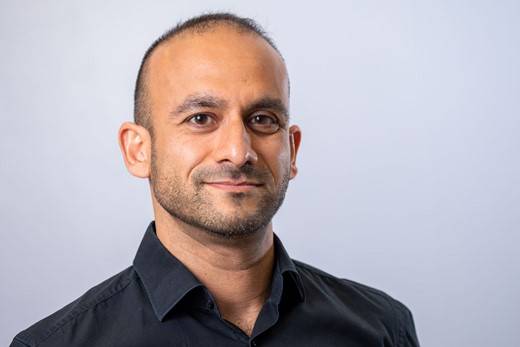Meet the Expert: Ahad Rahim
11 December 2020
Ahad Rahim is Professor of Translational Neuroscience at UCL and the Associate Director of Research at UCL’s School of Pharmacy.
Ahad leads a research team that focuses on studying rare paediatric neurodegenerative disorders, more common adult neurological diseases and developing novel therapies. His laboratory is involved in the development and pre-clinical testing of various biologics and advanced medicinal therapeutic products to treat the brain including AAV vector-mediated gene therapy, exosomes and neuroprotective peptide therapies.

Working closely with clinicians and regulators, Ahad aims to translate these new therapies from the bench to the clinic for patient benefit. Diseases currently being studied in the laboratory include Niemann-Pick disease type C, Gaucher disease, infantile neuroaxonal dystrophy, Batten’s disease, Parkinson's disease and neonatal hypoxic-ischemic encephalopathy.
We caught up with Ahad recently to ask him our ‘quick fire 5’ questions, and this is what he told us…
What attracted you to the area of translational neuroscience?
Ahad: I initially trained in the molecular biology of gene therapy vectors and applied the technology behind that to various diseases such as cystic fibrosis and cancer. I came to neuroscience a little later in my career but never looked back. The brain is splendid and imperious in its complexity and I fell in love with the anatomy of the brain. But I always wanted whatever I worked on to be clinically relevant and applicable.
Can you tell us what drives you to develop the novel therapies you are working on to treat the rare paediatric neurodegenerative disorders?
Ahad: The initial drive came from talking to clinicians at UCL Great Ormond Street Institute of Child Health who look after these patients. I felt their frustration with the lack of effective drugs or therapies to offer these children. I am now undoubtedly motivated by attending the patient and family organisation meetings every year. Each time you see the same children looking progressively worse, until you turn up the next year and some are no longer with us. Watching their children deteriorate tears families apart. We desperately need to develop effective therapies and drugs for these devastating conditions.
What area of your translational work most excites you and why?
Ahad: The potential of gene therapy to cure neurological diseases from a single ‘one and done’ dose really excites me. There is nothing simple about using modified viruses to deliver genes to a complex organ like the human brain and it is probably fair to say that some diseases will be more amenable than others. But if you look at some of the successes we are seeing in the babies treated using this technology it is astonishing.
What do you enjoy most about teaching and lecturing your students?
Ahad: Realising that amongst the sea of faces in the lecture theatre there may well be a future Nobel Prize winner or someone that will find the cure to cancer. I may end up working for them one day – I hope so!
What makes you jump out of bed at the beginning of each day?
Ahad: My over-arching aim is to develop treatments that could save lives. But I am blessed with the knowledge that I will walk into work tomorrow and engage with diverse, energetic, intelligent, dedicated and humorous colleagues. True professionals and leaders in their respective fields. But they remain remarkably grounded because at UCL, no matter how clever you think you are, there will always be someone smarter. The creativity you are surrounded by is infectious and I’m glad to be in the thick of it.
Further information:
Professor Ahad Rahim - staff profile
 Close
Close

